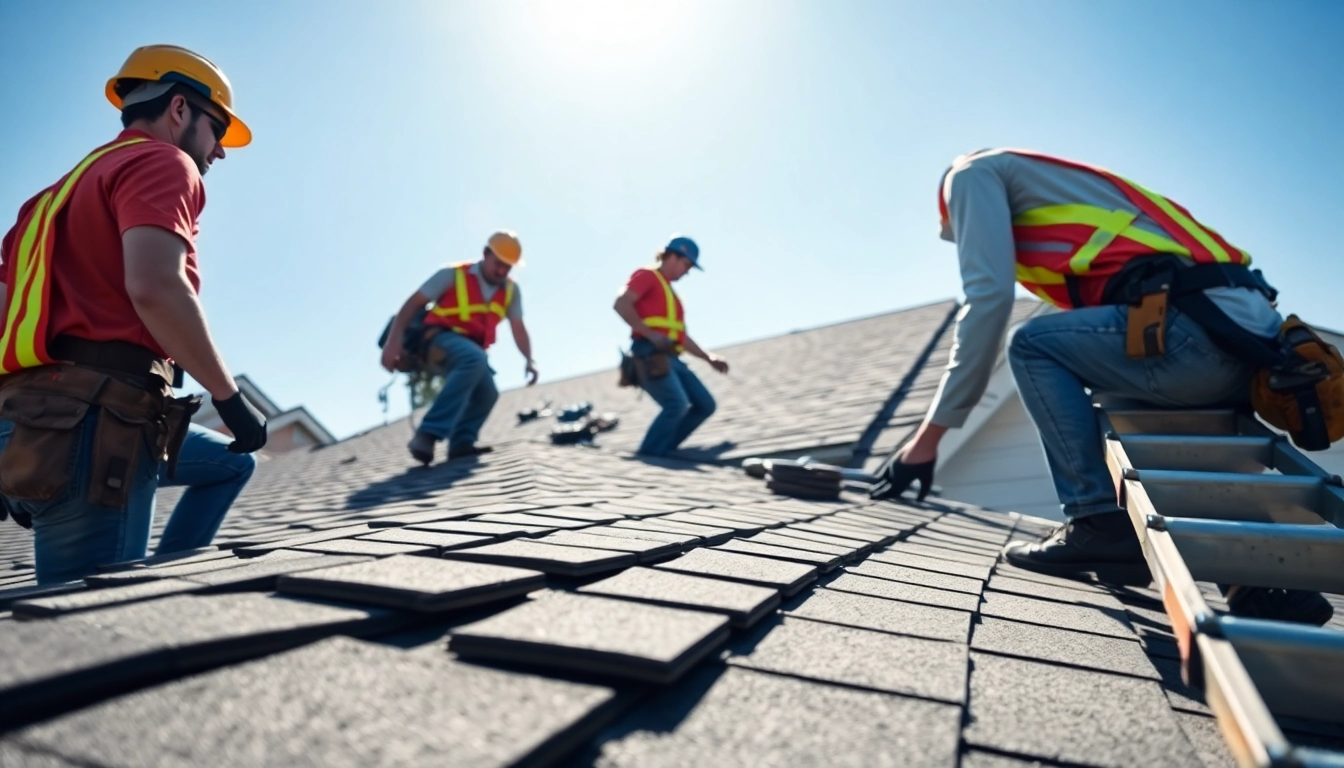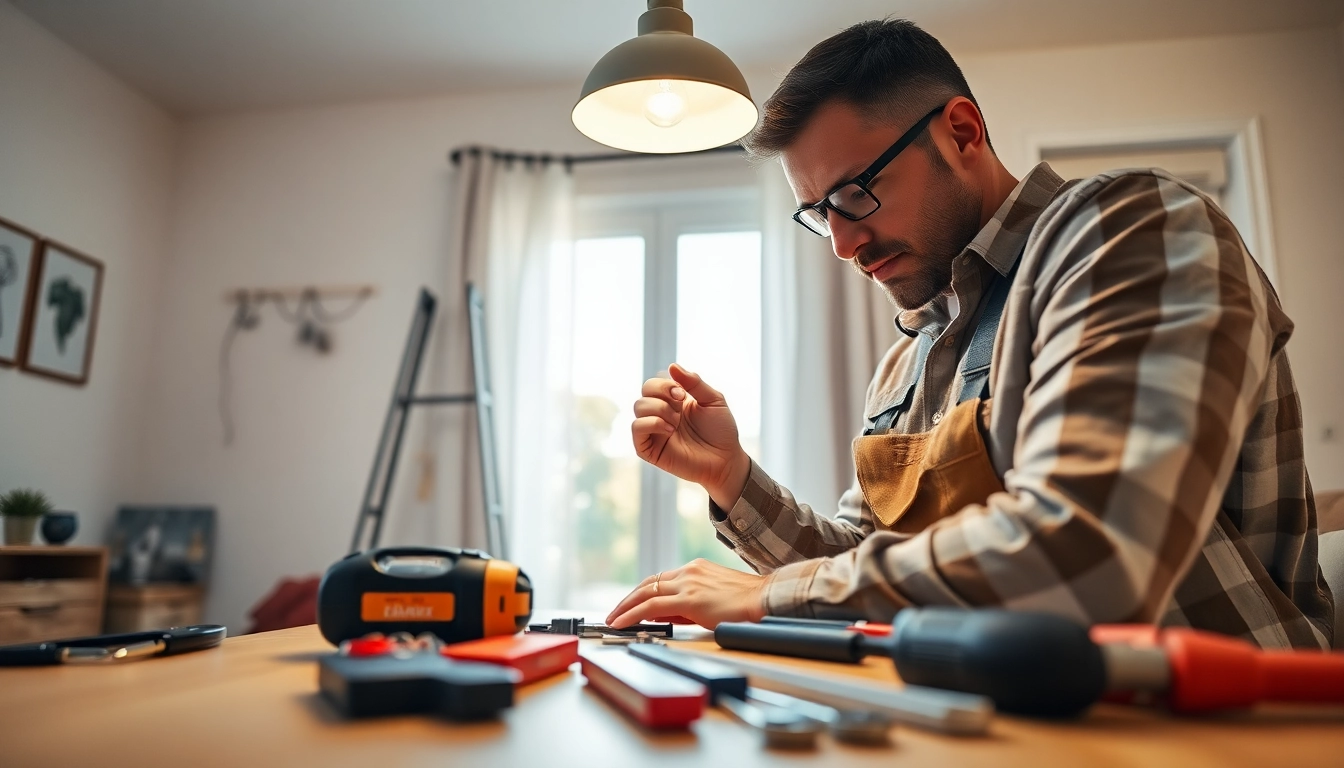Understanding the Role of Local Roofers Near Me
When you find yourself searching for local roofers near me, it’s essential to understand what you’re looking for and how these professionals play a vital role in maintaining the integrity of your home. Local roofers offer a variety of services that can greatly enhance the safety and aesthetic appeal of your property. Unlike national chains, these small businesses often have deep roots in the local community, which can be beneficial in terms of quality of service and customer relations.
What Services Do Local Roofers Offer?
Local roofers provide a wide range of services tailored to meet the needs of homeowners. These services typically include:
- Roof Repair: Addressing leaks, damaged shingles, or other structural issues that require immediate attention.
- Roof Replacement: Offering comprehensive solutions for replacing old or obsolete roofing systems.
- Installation of New Roofs: Designing and installing roofs for new constructions or home remodels.
- Maintenance Services: Regular inspections and upkeep to ensure the roof remains in good condition over time.
- Emergency Services: Quick response teams to handle urgent repairs due to unexpected weather conditions.
Why Choose Local Roofers Over National Chains?
Choosing local roofers comes with several advantages compared to opting for national corporations. Here are some reasons to seriously consider using local services:
- Personalized Service: Local roofers typically provide a more personalized approach, taking the time to understand the specific needs and concerns of their clients.
- Reputation and Accountability: They depend heavily on community reputation, which often translates into higher accountability and quality of work.
- Knowledge of Local Codes and Regulations: Local roofers are usually well-versed in local building codes and regulations, ensuring that all work is compliant and safe.
- Support for Local Economy: Hiring local businesses helps to boost the local economy and can strengthen community ties.
How to Identify a Reputable Local Roofer
Finding a trustworthy roofing contractor can be a daunting task. Here are some strategies to help you identify reputable local roofers:
- Check for Licensing and Insurance: Ensure the roofer is licensed and carries the appropriate insurance to protect you from liability.
- Ask for Referrals and Reviews: Speak to friends and family or consult online reviews to get a sense of the roofer’s reputation.
- Look for Established Businesses: Consider companies with a history and presence in the community, as they are likely to provide quality service.
- Request a Portfolio of Previous Work: A good roofer should be able to showcase a portfolio of past projects, highlighting their experience and expertise.
Key Factors to Consider When Hiring Roofers Near You
Evaluating Experience and Expertise
Experience is one of the most crucial factors to consider when hiring a roofer. Consider their years in the industry and the types of roofing systems they have worked with. Knowledge of various roofing materials (like asphalt, metal, and tile) and installation techniques can significantly influence the quality of the work done on your home.
Understanding Licensing and Insurance Requirements
Before hiring a roofer, it’s essential to confirm that they are properly licensed and insured. Licensing varies by state, so check what is required in your area. Insurance is also vital; it protects both you and the contractor in case of accidents during the roofing project. Always request proof of insurance and verify its validity before signing any contracts.
Reading Customer Reviews and Testimonials
Nothing speaks to a roofer’s reliability like the opinions of past customers. Take time to read reviews on platforms like Google, Yelp, and Angie’s List. Look for testimonials regarding their work quality, timeliness, and customer service. You can gain valuable insights into what you can expect from a particular roofer and ensure they possess a track record of successful installations or repairs.
Cost Considerations for Roofing Services in Your Area
Average Pricing for Common Roofing Services
The cost of roofing services can vary widely based on factors such as the type of roofing materials, the size of your roof, and your location. On average, homeowners can expect to pay between $3,000 to $10,000 for a new roof, while repairs might range from $200 to $1,500 depending on the damage. It’s essential to get multiple estimates from different local roofers to ensure you receive fair pricing.
How to Get Quotes from Local Roofers
To obtain quotes from local roofers, follow these steps:
- Prepare for the Consultation: Document any issues with your roof and gather information about its size, pitch, and age.
- Contact Several Contractors: Reach out to at least three local roofers to ensure you have a range of options.
- Request Detailed Estimates: Ask for a breakdown of costs, including materials, labor, and any additional fees.
- Compare and Evaluate: Compare quotes not just on price, but also on the materials offered and the warranty details.
What to Expect in Terms of Payment Terms
Understanding payment terms is crucial for avoiding unnecessary financial strain. Most roofing contractors will require a deposit upfront before commencing work, often between 10-30% of the total project cost. It’s advisable to discuss payment milestones based on project phases to ensure transparency. Be wary of roofers demanding full payment before the job is completed, as this may signal potential issues with the quality of service.
Maintenance Tips from Local Roofers to Extend Roof Lifespan
Signs Your Roof Needs Repair or Replacement
Recognizing the signs that your roof may need repairs or replacement can save you from more significant expenses down the road. Look for the following indicators:
- Curled or Buckled Shingles: This is often a sign that your shingles are aging and may need to be replaced soon.
- Leaks or Water Stains: Visible leaks or water stains on your ceilings often indicate underlying roof issues.
- Moss or Algae Growth: This can trap moisture and lead to structural damage if not addressed immediately.
- Deteriorated Flashing: Check areas around vents and chimneys where flashing is used. If this material is damaged, it can lead to leaks.
Seasonal Maintenance Checklist for Homeowners
Performing seasonal maintenance can significantly extend the life of your roof. Here’s a handy checklist to follow:
- Spring: Inspect for winter damage, check gutters for debris, and clear away branches or leaves.
- Summer: Check for signs of wear, clean gutters, and ensure proper ventilation is maintained.
- Fall: Remove leaves from the roof and gutters, and ensure winterizing is completed.
- Winter: Inspect for ice dams and address any snow buildup before it causes damage.
Best Practices for Roof Care Between Professional Inspections
In addition to seasonal maintenance, it’s essential to adopt several best practices for ongoing roof care:
- Regular Inspections: Aside from scheduled professional evaluations, perform your own visual inspections after storms.
- Keep Gutters Clean: This helps prevent water backup, which can lead to leaks and structural damage over time.
- Avoid Walking on the Roof: If possible, avoid walking on your roof to prevent damage. Use binoculars for a closer inspection.
Maximizing Your Investment: Warranty and Aftercare from Local Roofers
Understanding Roofing Warranties and Guarantees
When investing in roofing services, it’s crucial to understand the various warranties offered. There are typically two types of warranties:
- Material Warranty: This covers any defects in roofing materials for a specified period, typically ranging from 20 years to a lifetime.
- Workmanship Warranty: This ensures that the roof installation was performed correctly, protecting you from issues arising due to improper installation for a set time, generally between 1-10 years.
What Aftercare Services Should Local Roofers Provide?
After a roofing project is completed, it’s important for local roofers to provide thorough aftercare services. These can include:
- Regular Follow-Up Inspections: To ensure that the installation has held up and to address any emerging issues.
- Recommendations for Maintenance: Providing homeowners with specific guidelines for roof maintenance based on their unique roofing materials.
- Emergency Support: Offering immediate help in case of unexpected damage from storms or other calamities.
How to Maintain Communication with Your Roofer Post-Installation
Good communication is key to maintaining a successful relationship with your roofer even after the job is done. Here are ways to ensure ongoing communication:
- Keep Their Contact Information Handy: Save your roofer’s contact information for easy access in case of emergencies or follow-up questions.
- Schedule Regular Check-Ins: Consider establishing regular check-ins, especially after heavy storms or other events that may impact your roof.
- Provide Feedback: Constructive feedback can help your roofer improve their services and can also help future customers in making informed decisions.



